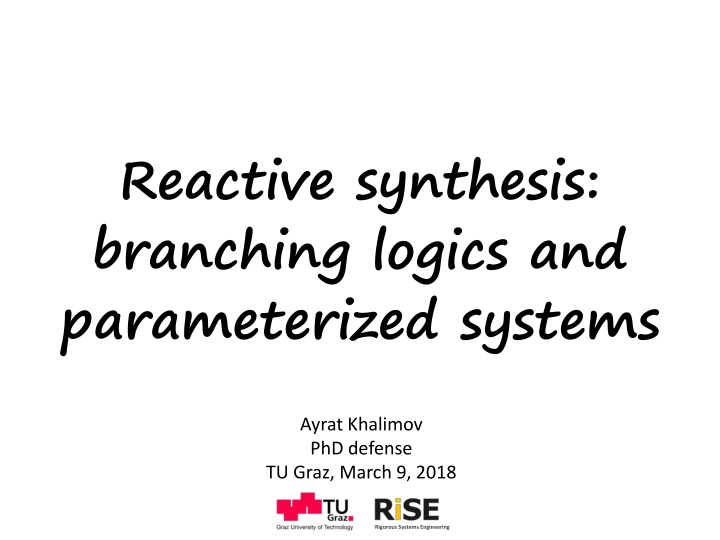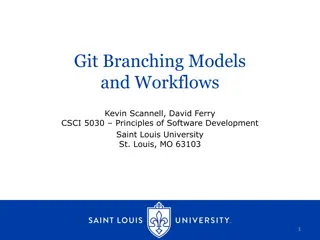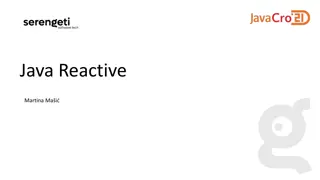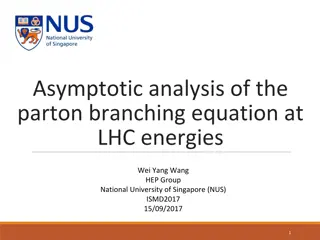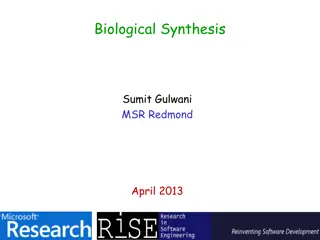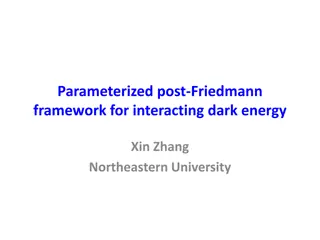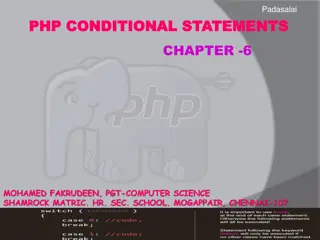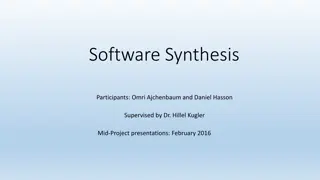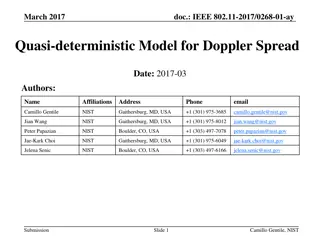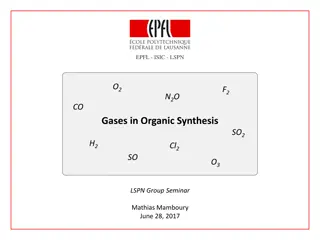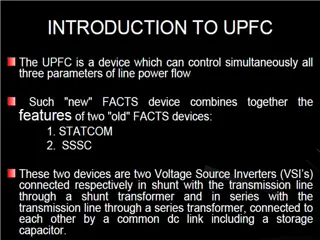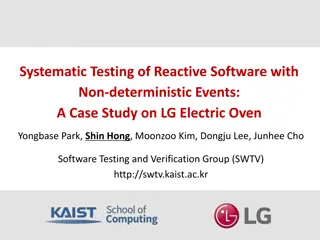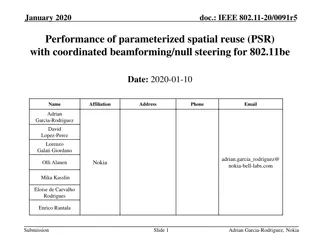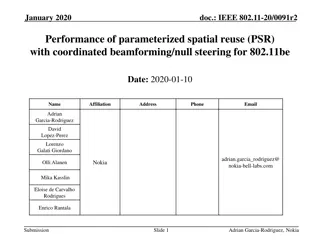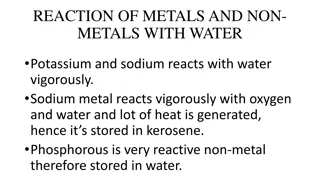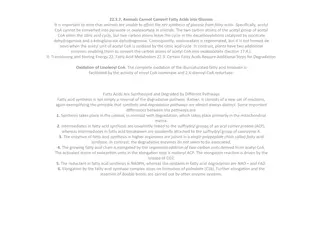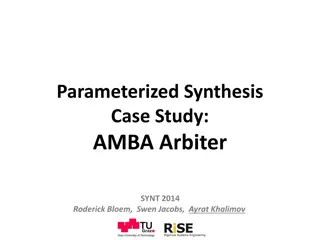Reactive Synthesis: Branching Logics and Parameterized Systems
Reactive synthesis involves generating a system that satisfies a given specification in various logics, focusing on inputs, outputs, and granting requests. The research delves into the challenges, motivations, and solutions in the field, offering deeper insights into linear temporal logic, computation tree logic, and innovative approaches to system synthesis from complex languages.
Download Presentation

Please find below an Image/Link to download the presentation.
The content on the website is provided AS IS for your information and personal use only. It may not be sold, licensed, or shared on other websites without obtaining consent from the author.If you encounter any issues during the download, it is possible that the publisher has removed the file from their server.
You are allowed to download the files provided on this website for personal or commercial use, subject to the condition that they are used lawfully. All files are the property of their respective owners.
The content on the website is provided AS IS for your information and personal use only. It may not be sold, licensed, or shared on other websites without obtaining consent from the author.
E N D
Presentation Transcript
Reactive synthesis: branching logics and parameterized systems Ayrat Khalimov PhD defense TU Graz, March 9, 2018 Rigorous Systems Engineering
What is reactive synthesis? ? ? requirements programmer system A module with input r and output ?, and every request ? should be granted ? ? ? = {?},? = {?}, ?(? ? ?) ? ? ? ? ? 2
Reactive synthesis problem Given: specification in some logic Output: system of some kind that satisfies We play with both ingredients: Part 1: logic Part 2: systems But what is the problem with the current? 3
Motivation for my research in Part I Consider the previous example ?(? ? ?) ? ? ? In reality the synthesizer produces: Write better specifications, but keep the declarative nature ( what , not how ): - There should exista way to lower the grant 4
Motivation for my research in Part II Use synthesis when writing specifications worth it In the arbiter example, what if there are 10 requests? 100? ?: ? ?? ? ?? ? ?:? ?? ?? parameterized synthesis: - find a block that can be cloned 5
Thesis overview It is hard to write good specifications for synthesis. Part I studies synthesis from richerlanguages - Two new approaches for CTL* synthesis Part II studies synthesis of richer systems - New cutoffs and a case study 6
Part I Approaches to CTL* synthesis 7
What is Linear Temporal Logic (LTL)? A machine maps inputs to outputs ? ? ? ? ( ? ?)(??)(??)( ? ?) ? ? An LTL formula ??? describes infinite computations ?(? ??), ?(? ??), ?(? ?? ?), ??( ?) ??? (?) ?(? ??) 8
What is Computation Tree Logic (CTL*)? A machine maps inputs to outputs ? ? ? ? ? ? CTL* can describe possibilities using ? and ? ????, ??(? ? ?), ???? ? ??? ???? ? 9
Why CTL* is (not) useful? Recall the lazy arbiter that satisfies ??(? ??) ? ? ? To avoid lazy arbiters the designer can (automatically) add ??? ? or ???? ? CTL* is declarative Writing CTL* properties is hard 10
Thesis contribution to CTL* synthesis Already known - Safra-full CTL* synthesis [62] New: - Bounded synthesis approach - Synthesis via reduction to LTL 11
Bounded synthesis for LTL [46] Encode model checking into SMT - the query is satisfiable ??? Synthesis: replace system with the unknown - ???: sys ? LTL automaton ? return ???k SMT query ???? ?? return (unknown) ???? unrealizable for k 12
Bounded synthesis for CTL* ????? ?????? ?? ?? ? ??? ? automata ????? ??? ? CTL return ???k SMT query ???? ?????? (unknown) ???? return unrealizable for k 13
Bounded synthesis for CTL* + Finds smallest models + Flexible + Inherits progress in SMTs - Bad at establishing unrealizability - Requires additional development - SMTs are not very fast 14
CTL* synthesis via LTL synthesis Synthesize proof along the models: - for each sub-formula ?? or ??, introduce new system output ??? or ??? - for each ??, introduce direction-output ??? that encodes system path that satisfies ? LTL formula says: - ? ??? ? - "? ??? ???? ? " (roughly) - The top-level proposition holds initially 15
Example The top-level proposition holds initially ? ??? ? "? ??? ???? ? " (roughly) ???? = ?? ? ? ? , inputs={r}, outputs={g} inputs={r}, outputs={?,?,?} ????= ? ?(? ?? = ? ? ? ? ? ) ? ? = 0 ? = 1 16
Properties of the reduction ??? is realizable ??? is realizable ??? 2| ??? | Yet the synthesis complexity stays in 2EXPTIME Systems can get larger Experiments: faster when the # of E-formulas is small 17
Concluding Part I Two approaches to CTL* synthesis - bounded synthesis approach - reduction via LTL 18
Part II Parameterized synthesis 19
Token rings 22
Parameterized synthesis problem Given parameterized specification , find a process implementation P : ?:?? ? 23
Why? # of clients Synthesis time of AMBA protocol 24
Cutoffs in token rings [40,50] ?.?(?) ?,?: ?(?,?) ?.?(?,? + ?)
Contributions in Part II Token ring architectures: - Optimizations of bounded synthesis modular cutoffs hub abstraction - AMBA case study cutoff extensions incremental property synthesis Guarded systems: - we significantly extended cutoffs of [37] 26
Conclusion 1. Two new synthesis approaches for CTL*: - using bounded synthesis (flexible but slow) - by reducing to LTL synthesis (often faster) 2. New cutoffs and tricks for parameterized synthesis - token-rings: small cutoff extensions, efficient optimizations - guarded systems: new cutoffs Future work: - other reductions to LTL synthesis - synthesis with parameterized data 27
Other works Decidability of parameterized verification, book Parameterized Model Checking of Token-Passing Systems Semi-Formal Methods for Soft Error Analysis 28
